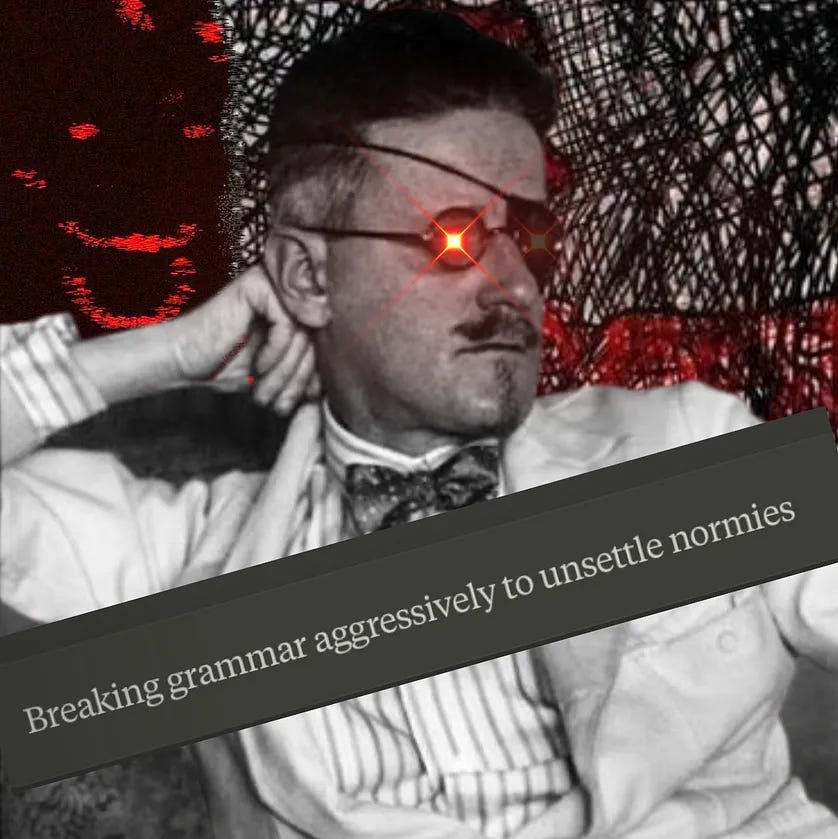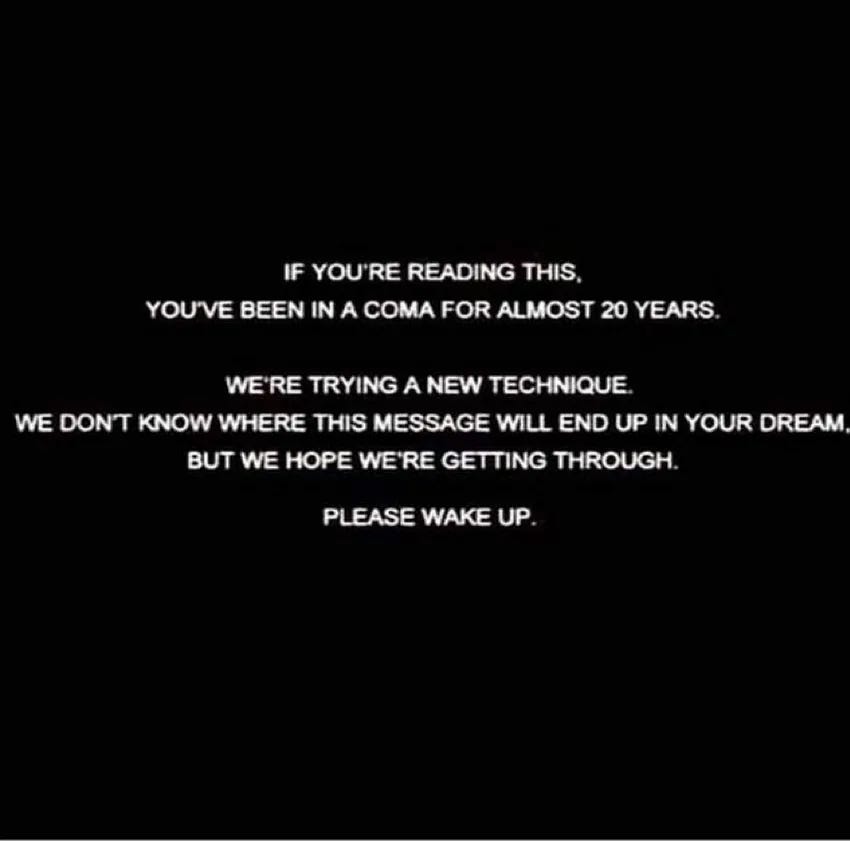Literature is pure metaphysics
on books, reading, writing, and phenomenology of those (among other things or a lack thereof)
I don’t like the process of reading; there’s nothing more boring than staring at letters. I do, however, love what happens in my head in the process and hate when nothing happens. If the text fails to make my brain go brrr1, its existence falls victim to my selective solipsism2. Yet I can’t listen to audiobooks because my mind always slips somewhere else, which happens when I read a book, too, but it’s easier to get back, reread, pause, etm. if it’s letters and not sounds. Yet behind the letters are sounds; I can’t read without vocalising everything in my head and hear it. If I try to read without vocalising, I begin to skim and comprehension falls below zero, in which case I’m becoming dumber when “reading”, specifically because I perform reading but don’t actually do that meanwhile exposing myself to someone’s thoughts that aren’t properly filtered through my own grey sponge. Yet I can’t read aloud because inside my head, the pronunciation, intonations, etm. are perfect but when I do the same physically, it becomes slop. This all leaves me with only one viable way of reading—my internal narrator, or a few of them, reading everything to me in my head in a slow, measured way. Only that can make the process enjoyable, otherwise it’s just looking at letters.
I can’t imagine reading differently, so when my characters have to read, they engage into somewhat similar process, a variation or a reflection of it. If I can’t understand what reading is and what I like and hate about it, which also varies at times, maybe my characters can? What is reading to them?
Such as in my recent short story “Cancelled Due to Weather Conditions” (that also involves airports, Tulubaika, psychological conundrums, creepy booksellers, etm.) ruminations on reading become a major theme. Our heroine is stuck waiting for her flight and has nothing to do but to entangle and disentangle various threads of ideas:
Can't imagine how people can read for hours, she wondered. During that time, so many thoughts accumulate in my head that they simply start tumbling out of my ear canals, perch on them and (whoosh!) slide down as if from a hill; and they fly, fly, fly one after another, perch, slide, fly in an avalanche flow, like a crowd rushing for the festive shopping, stick together, fly, fly, fly, stick together and continue to fly and stick together, layering like a snowball, until you simply furrow your brow and put the book aside. You just need to distract yourself, but not so much as to change context, do something else or clear your head, no, not like that at all; you need to distract yourself from the very act of reading because thoughts become too many and continue to become only more until you process them like that washed laundry that lies on the chair and waits for someone to fold it, but at some point it starts falling from the chair, and that's when you realise—it's time. The residents of the modest abode shrug and go to fold it, what else can they do? The very act of reading rather pulls you into some spiral whirlpool than helps you relax. Few things help to relax at all, reading certainly isn’t one of them. It's a kind of work that brings pleasure, but pleasure not in following the plot and unravelling its tangles and tangles of characters' lives, but the kind you get from intently observing nature, the sea, a crowded street, scenes of carnal love, scenes of platonic love, stars, birdsong, tits drunk on fermented frozen rowan berries and singing their avian chanson. You sit, eyes bulging, ears spread wide, a joy to behold, blimey, what a delight. Each word, phrase, sentence, plot twist seems to program you for something, and you feel yourself becoming programmed. They, these units of text, units of the author's thought, awaken in you your own uncountable thoughts, which gradually emerge from darkness, from being extras they become main characters and occupy all attention, sit on sleds and slide down the slopes of ear canals, fly, fly, fly, squinting, until silence settles in your head.
And then later:
Reading is sadomasochism for many reasons, starting, for example, with disconnection from reality, complete and irreversible immersion from the physical world filled with other people into your own world where among people, apart from yourself and the author, there is no one, causing inner loneliness to become embarrassed, its cheeks to redden and it to go far away, so as not to see the two of you, you and the author, anymore. You upset it, this puritanical loneliness, with your loose behaviour, because how can one be so obsessed as to let another person into her temple, that is, into her brain, be it a man or a woman or even thinking rock. It's less indecent, by the way, when you read something composed by thinking rock, because there is no metaphysical connection of minds, but only the connection of one mind with emptiness or the thickness of emptiness that arose through the connection of many minds—the collective mind, anima mundi. It's like hearing voices in a cemetery, which all at once, all without exception, begin to talk to you through a narrow bottleneck. Boo! Here you are walking through a cemetery and thinking, who are all these people, and why should I listen to them? They're dead, but they all talk and talk, and then sing and dance, like in Indian films or musicals. Not all, of course, but some of them, those whose voice hasn't faded. Not because they shouted too loudly (although there are such ones), but because they broadcasted on their frequency, which no one has yet occupied, where there's less noise, and neither dictators with their thought police prohibiting communication on generally accepted frequencies nor all sorts of tech bros with their social media can reach.
Or even in dialogue with a bookseller:
—… Sometimes it feels like I've spent my whole life waiting in an airport. Or rather, not like that, but like this: right now, at this moment, it seems to me that I've been waiting precisely for it, this moment, and I don't seem to remember life before it. It's like good literature—not about what it seems to be about. All these three hundred pages that I've already read, in fact had no meaning at all, it was just the author amusing herself and entertaining us. She needed to invent these three hundred pages to somehow justify the existence of this single sentence that came to her mind when, perhaps (or perhaps not), she was making love, riding the tube, talking with a friend, listening to an absolutely shameless presentation at work in absolutely shameless corporate jargon. You understand?
It all is, of course, fully fictional. You can read the story here:
Alternative, albeit similar, view on reading you can find in my novel “Deleted Scenes from the Bestselling Utopian Novel”. In the second chapter:
Nothing. Nothing is happening; minutes pass, hours, days, nobody comes, nobody knocks, nobody calls. It's just a ghost of us in an empty, cold flat alone with our thoughts, haunted by them. The vision of the outside world has gone nil. The sun is a parody of intermission in the unremitting winter nights. It is, in fact, not a star but a mere gas lantern with a lamplighter who is neither a night owl nor a morning lark, but a drunkard. A dense and damp fog, palpable if you open the window and try to feel it with your fingers, veils everything beyond a few metres, and the world becomes white, as if we, on our thirteenth floor, live in a concrete box somewhere in cloudy cuckoo land, and all we have left to do is to gaze into the white wall and let our brain do a photomontage of images, a kaleidoscope, a labyrinth of what-ifs, with or without permission from our free will. Books are impotent word-coffins—the number of our thoughts flashing simultaneously eclipses anything that the author could condense into her creation, failing to compete with our mind. Thank you, author, we have enough of our own thoughts to think. We like thinking thoughts. They are perfectly thinkable. In fact, each of our thoughts is an author itself, an autonomous agent that keeps seething inside our mind, writing stories, so all we have left to do is to surrender, succumb, stare into the emptiness on the other side of the window and let each story unfold. Oh, they end terribly; the best thing that can happen in them is nothing, and the best we can hope for is no resolution. Otherwise, there's always somebody beaten or dead, or not some- but everybody. It's much better when the story fractures, breaks off and diverges, as if the author is knackered “from writing it and switches to a new one, more interesting, where, however, more interesting means more dismal, spawning numerous branches of inhumanity, which, no matter how we try to stifle them, evade and resurge in strange and unexpected places, like blackberry bushes taking over our granny's garden every summer anew. Not sure we want to tell any of these stories. Not sure we want to tell any story at all. It's better to tell something absurd, create a literary cage, the content of which cannot exist under any possible conditions anywhere and nowhere. Some stories must not see reality, for they may emerge into it, merge with it and make it far worse than it already is.
The whole process of reading “makes sense” and has a point only if a metaphysical connection between a reader and a writer occurs. That metaphysical connection involves both ventriloquism and telepathy such that author’s thoughts are replayed through someone’s body and can be heard distances away (see “hardware and software” if you fancy computer analogies because “everything is computer” given we’re in the 21st century). Can that connection be felt and experienced? Perhaps we can say that these days the internet expands that process and paradoxically makes it more physical. You can put likes and leave comments and directly chat with an author and discuss his or her work, watch a live video, listen to a podcast and other things. Chronologically it’s a luxury yet artistically it’s redundant because writers didn’t have it in those “pure” days of yore and don’t really need it now despite it’s, of course, pleasant and can be meaningful and helpful. The internet, after all, allows everyone to participate in culture without leaving their home and that participation almost implies a dialogue. However, it can’t really replace that metaphysical connection I was referring to, and no amount of likes and comments would replace “a feeling” that two minds are now connected. One may say “writing for yourself” solves the problem because in that case no connection is needed given you’re always connected to yourself but is it really the case? It’s always a connection with some of the selves, be they fragments or archetypes or something else, some exact selves with whom that piece of writing resonates otherwise I’m afraid it’s utterly meaningless. Thus connection with a part of self becomes a connection with someone who has a similar part of self and the magic happens. For both writers and readers, believing in that turns literature in a form of religious practice and a piece of writing into a conduit between minds. Without the conduit, there’s no connection and that’s why the conduit is what matters. The conduit must possess an internal solipsism otherwise it would self-destruct decompose. The conduit follows its own rules and exists in its own world allowing the connection to happen. The conduit is both bigger than its author and grander than its reader. Thus, for the conduit to realise its full potential, the author must abandon the ego3 or hide it well enough or transcend it altogether. Hence the literary conduits are the most powerful because they often do all three together. When those conditions are met, in reality, the connection, paradoxically and ironically, exists not between the author and reader but between each of them and the work, making it, the work, most important part of the process, otherwise, the whole process isn’t possible. After every single morpheme, the author dies and lives within his or her work and the author’s mind then recreated in the mind of the reader. Both reading and writing thus become rituals, a dialogue with what might seem as a void but when done truthfully is the exact opposite of it. That void | anti-void exists for its own sake in the same way as any grand thing exist only for their own sake (without, so to say, “a profit incentive”).
That’s why true literature is pure metaphysics. It takes courage and irrational mind to feel and embrace the comfy abürdity4 and keep doing something for its own sake. It’s not a communication but a communion.
VISUAL ENTERTAINMENT SECTION:
The "brain go brrr" phenomenon refers to the sudden cascade of dopamine and norepinephrine release in the prefrontal cortex when encountering high-interest stimuli, creating a neurological reward state, outside of which I can barely function.
“His tireless questioning and rebelling against the nature of things resulted not so much in the world becoming an adjunct to his intellect as in him becoming an adjunct to the world, the world's prisoner if you like.”
— László Krasznahorkai about me in “The Melancholy of Resistance”, coincidentally one of my favourite novels.
See also some Heraclitean observations such as “The hidden harmony is better than the obvious” and “They do not understand how that which differs with itself is in agreement: harmony consists of opposing tension, like that of the bow and the lyre” and “Immortals are mortal, mortals are immortal, each living in the other's death and dying the other's life” which all may bear no relation to each other or this post whatsoever (or may bear yes).
Only this spelling of this word is allowed in English (or any language) from now on. The "ü" sound doesn’t exist in English but only because you haven’t tried it. I unleash it from its anti-memetic prison and let it roam through the world. Thus "absürd" should be pronounced like this—position your tongue as if saying "ee" (as in "see") while simultaneously rounding your lips as if saying "oo" (as in "boot").









Oh what a fascinating post
(even though I love the process of reading, letters are alive and colorful, one needs sometimes to tone them down for they might interfere. and in general -I love the process of reading)
I find it very hard indeed to abandon the ego because I'm not sure I have one at all. More or less shaped I mean. It becomes что нибудь ненужное, которое нужно сперва иметь, чтобы его продать, or how it was in "Prostokvashino".
The shreds that one has -yes indeed courage is needed, if you give up even miserable shreds you dissolve completely.
Wonderful essay, and thank you for it